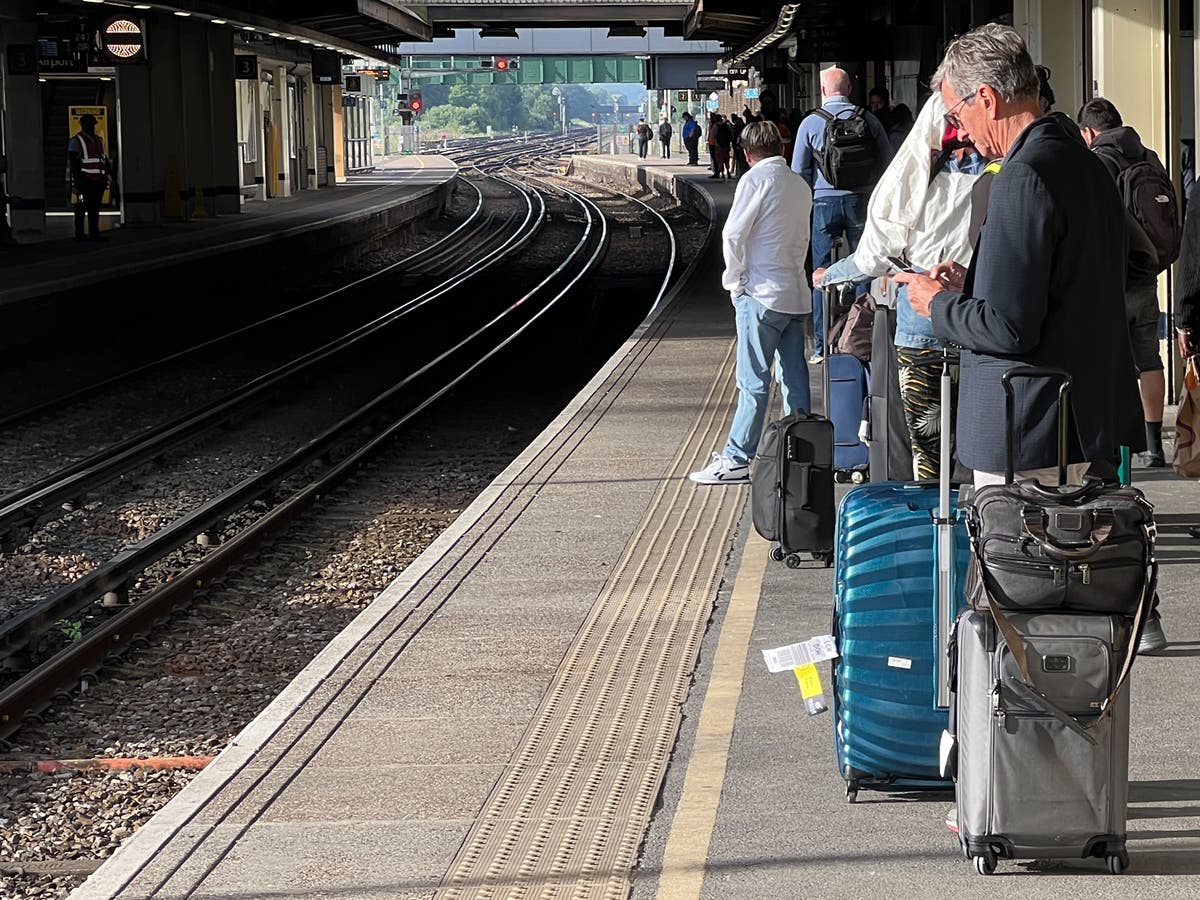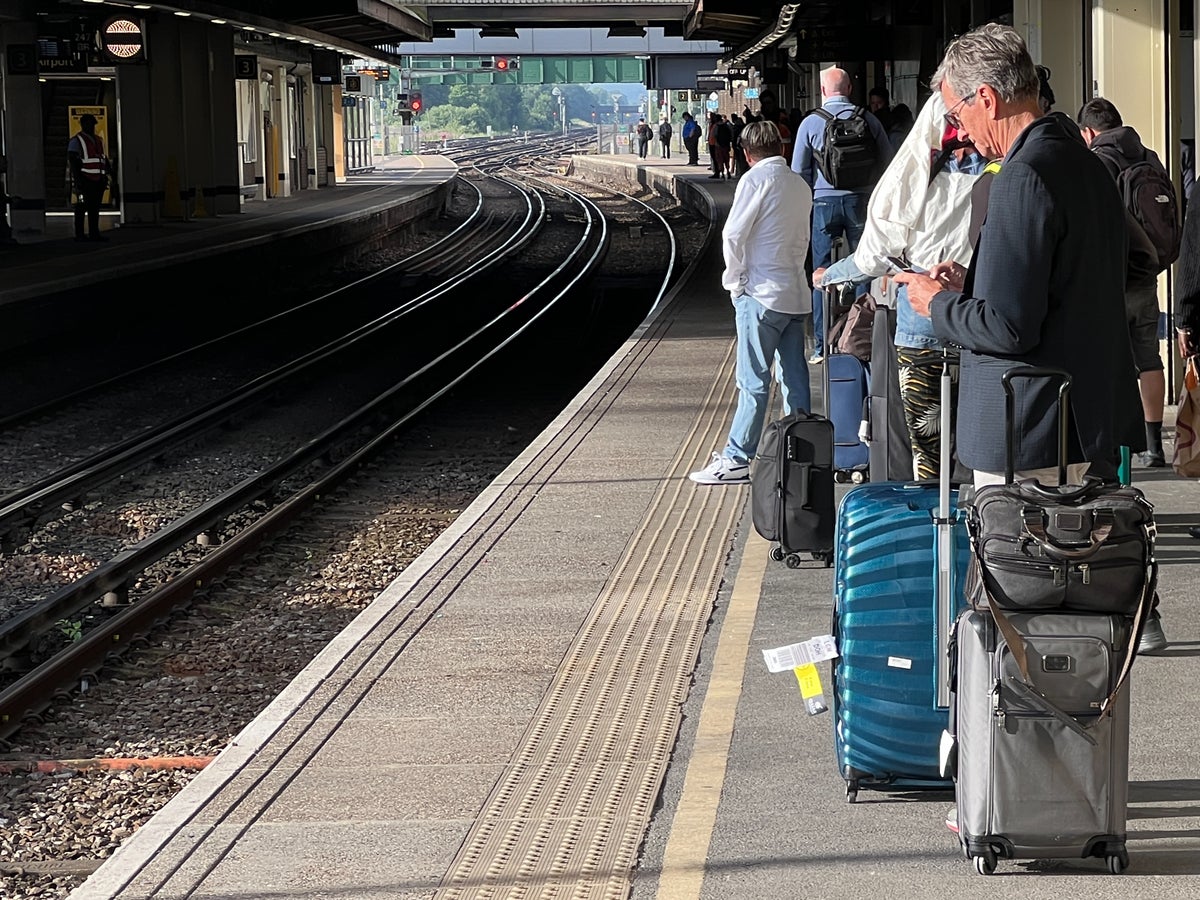Another national rail strike will hit train travellers across Great Britain on Wednesday 27 July.
Members of the RMT union working for Network Rail as well as Avanti West Coast, East Midlands Railway, Greater Anglia, GWR, LNER, Northern, Southeastern, South Western Railway and other train operators will take industrial action for 24 hours. Workers for train operators will walk out from 12.01am, with Network Rail staff stopping work from 2am.
Who is going on strike – and why?
Members of the RMT union, which comprises a wide range of rail staff from cleaners and station staff to signallers and guards, are involved in a dispute over pay, jobs and conditions.
They walked out in the first national rail strike for three decades on 21, 23 and 25 June. Talks have continued since then, but not to the satisfaction of the union.
The RMT general secretary, Mick Lynch, called an improved Network Rail offer “a paltry sum [which] is conditional on RMT members agreeing to drastic changes in their working lives”.
He said: “Strike action is the only course open to us to make both the rail industry and government understand that this dispute will continue for as long as it takes, until we get a negotiated settlement.”
Earlier his deputy, Eddie Dempsey, told MPs rail workers were being used as “a political football”.
He said: “The people on the other side of the table that we’re dealing with are telling us they regard themselves as brokers, not negotiators.
“They tell us they’ve got a mandate that they’ve got to refresh. They often have to leave the room to go and have a conversation with their ministerial people before they can continue discussions with us.
“We’re in a room with people that are not able to make decisions.”
The transport secretary, Grant Shapps said: “The railway must reform and modernise, and yesterday the RMT were offered a fair deal which would see salaries of their members rise by up to 8 per cent after two years to deliver just that.
“Yet the RMT has already opted for more destructive strikes and is hellbent on causing further misery for people across the country.
“No deal was ever going to be good enough for the RMT, and the negotiations over recent weeks have merely been for show while they plan how best to cause further chaos.
“The industry is already on life support and by insisting on working against its employers, instead of with them, the RMT risks pulling the plug for good.”
Will the network shut down?
No. At Network Rail, the infrastructure provider, the most critical roles in the day-to-day running of the railway are 5,000 signallers. It is likely that management and non-union members will allow trains to run on about half of the nation’s railways.
Train operators are currently bidding to run some services, as they did on the previous three strike days. On all lines that are running, there will be strict limits on the amount of traffic replacement signallers could handle.
Which trains could run?
A normal service will run on the eight-mile Isle of Wight line. But elsewhere the normal schedules will be severely disrupted.
Last time 22 per cent of passenger train services ran – most of them on key links to and from London – from around 7.30am until 6.30pm. Given that the reduced timetable ran fairly smoothly, it could be that more than 4,500 of the usual 20,000 daily passenger trains will be operated.
The key links to and from London that are likely to operate, clockwise from the Thames Estuary, are:
- HS1 from London St Pancras to Ashford (including Eurostar services to Paris, Brussels and Amsterdam)
- London to Gatwick airport and Brighton
- London Waterloo to Reading, Winchester and Southampton
- London Paddington to Reading, Taunton, Exeter, Plymouth, Bath, Bristol, Cardiff
- London Paddington to Heathrow airport (all terminals)
- London Marylebone to Banbury
- West Coast main line from London Euston to Birmingham, Manchester and Glasgow
- East Midlands Railway from London St Pancras to Leicester, Nottingham, Derby and Sheffield
- East Coast main line from London King’s Cross to Leeds, York and Newcastle
- London King’s Cross to Cambridge and Ely
- London Liverpool Street to Stansted airport and Cambridge
In addition, a limited number of key routes not touching London will operate:
- Glasgow to Edinburgh and other Central Belt commuter services
- Cardiff to the Valleys
- Birmingham to Leeds and Newcastle
- East-west links from Liverpool via Manchester and Leeds to Cleethorpes and Middlesbrough, with some trains serving Manchester airport.
Can I start planning my travel for that day, then?
No. Wait until timetables are published – probably by 20 July. As a result of the limited hours, last trains will be very early. Key final services last time left London at:
- Bristol 4.33pm
- Cardiff 4.27pm
- Birmingham 3.50pm
- Manchester 3.40pm
- Sheffield 3.31pm
- Leeds 3.05pm
- Newcastle 3pm
- Edinburgh 2pm
Will other days be affected?
Yes. The industrial action is timed to affect services immediately before and after the strike day – particularly late trains on 26 July and early departures on 28 July.
What do the employers say?
Andrew Haines, chief executive of Network Rail, said: “It is incredibly frustrating the RMT has again chosen to disrupt our passengers, and even more so that they haven’t even put what was a fair and affordable two-year pay offer to their members.
“It is also deeply worrying that these strikes have clearly been designed to disrupt spectators heading to the opening of the Commonwealth Games in Birmingham on 28 July, an event of huge national significance.
“We have been clear that we can only fund an increase from our own budgets, and the only way we can afford that is by modernising working practices.
“The RMT’s rejection of our latest offer can only mean they want a pay increase to be funded either by more taxpayer support or higher passenger fares, neither of which we think are fair.”
A spokesperson for the Rail Delivery Group said: “This latest round of action will cause more misery for millions and take money out of the industry at a time when passenger numbers remain 20 per cent below pre-pandemic levels, making it harder to afford a pay increase.
“We want to give our people a pay raise. But to do that we have bring working practices that are in some cases decades old up to date so that we can adapt to new, more leisure-led travel patterns – including making Sunday part of the standard working week so that services are more reliable at weekends.”
Could the strike be called off?
In theory: all sides say they want to continue negotiations.
Andrew Haines of Network Rail says: “We urge the RMT to call this action off, get back round the table with us and show some willingness to compromise.”
The spokesperson for the Rail Delivery Group said: “Instead of staging more counterproductive strikes, we ask the RMT to come back to the table so we can deliver a deal that works for our people, our passengers and for taxpayers.”
The RMT says: “We remain open for further talks.”
But the chances of a settlement before 27 July look slim.
Are other strikes on the horizon?
Yes, train drivers belonging to Aslef who work for eight train operators have voted strongly in favour of strikes.
The long-distance rail firms that face stoppages are LNER, GWR, and TransPennine Express.
In addition five commuter-focused operators are affected: Chiltern, London Overground (run by Arriva), Northern, Southeastern and West Midlands.
No dates have been announced for industrial action, and at least two weeks’ notice must be given of any strike.



More Stories
Everything you need to know about July and August rail industrial action
‘It’s cancerous’: How seaside towns fight back against second home owners
EasyJet flight diverted after passenger medical emergency on board